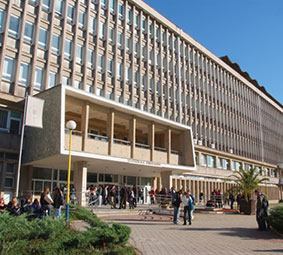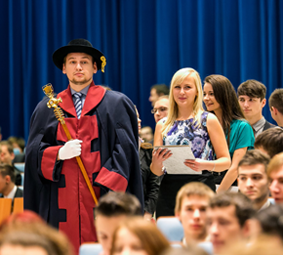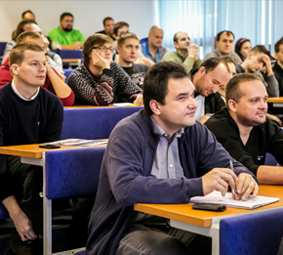Projects
|
Project name |
Project description |
|---|---|
| ERASMUS+ KA1 - Mobility projects between Programme and Partner Countries in the field of higher education |
2015-1-SK01-KA107-008876 - Mobilita študentov a zamestnancov vysokých škôl do/z partnerských krajín |
| European Research Network on Formal Proofs |
If testing can reveal errors in computer programs, only formal verification can guarantee their absence. The highest Evaluation Assurance Levels of the Common Criteria for Information Technology Security Evaluation require automatically checked mathematical proofs of correctness. Proofs are also the basis of mathematics and many sciences, and thus are very important in education and research. In many computer technologies, developers and users rely on standard languages and protocols for exchanging data and enabling tool interoperability: TCP/IP for network communication, HTML for web pages, etc. This is however not the case for formal proofs, which is a major bottleneck for their adoption by the industry. The main reason is that, currently, proof systems use mutually incompatible logical foundations. Fortunately, only small parts of the proofs developed in a system use features that are incompatible with other systems. Europe is a leading actor in the area of formal proofs: about 65% of the proof systems of the world are developed in Europe, including the two most used proof assistants, Coq and Isabelle. This Action aims at boosting the interoperability and usability of proof systems and making formal proofs enter a new era. For the first time, it gathers all the developers and users of proof systems in Europe. To make the proofs exchangeable, they will express, in a common logical framework, the logical foundations of their systems and develop tools for inter-translation of the proofs developed in individual systems to and from this common logical framework. |
| Evaluation and metrics of domain usability |
Usability makes the work with user interfaces better and more effective in all domains. Domain usability is an aspect of general usability, which deals with the domain content of user interfaces from the terminological point of view. If there are incorrect terms in the user interface, or it contains grammatical or stylistical errors, its usability is lowered. The main goal of this project is to design a method and tools, which would support the development of usable user interfaces from the domain point of view. This way we want to contribute to the development of better and more human-friendly user interfaces. This goal requires the identification of methods for evaluating the usability of user interfaces and metrics, which are used in this evaluation. Consequently, the design of metrics and automatized method for evaluating domain usability of user interfaces is needed. |
| Evolving Architectural Knowledge in the Edge-to-Cloud Continuum |
In order to make it more approachable by practitioners, there is a need to bring the global architectural knowledge to the local level of software development companies and even individual teams and let it evolve there with respect to the context in which it's being applied. For example, design patterns would be possibly rephrased and adapted, particular pattern sequences would be created and supported by the success stories of that particular community (so-called pattern stories), and so on. Architectural knowledge needs to be evolved further with respect to the fact that contemporary software systems operate in the edge-to-cloud continuum. The edge-to-cloud continuum introduces new possibilities for variation that depend on how the system is deployed on edge, mist, fog, and cloud levels. Another challenge is how to effectively organize people in such environment. Parts of this, locally evolved knowledge would then find their way to the global level in scientific papers, books, or even blogs and such. In this project, we will develop methods of evolving local variants of design patterns and pattern languages, design pattern application in the edge-to-cloud continuum, applying software product lines in the edge-to-cloud continuum, and organizational pattern application in software development in the edge-to-cloud continuum. To support and evaluate the methods, we will develop the corresponding tools. We also expect to mine and express currently unknown design and organizational patterns and pattern languages for the edge-to-cloud continuum. We will develop four evaluation scenarios: patient health status telemonitoring, automotive software compliance, education content engineering, and open space development.
|
| Focusing Education on Composability, Comprehensibility and Correctness of Working Software |
The main objective of the project is to train educators from selected universities (e.g. partners are training other partners in this project) in the field of functional programming (FP) and closely related areas of informatics that this trained university staff then will contribute to the increasing of the level of education at their home university. Partners train other partners in selected area of FP by sharing their research results and using their (specific) teaching experience and methods. We expect novel knowledge to be taught in all theoretical levels. |
| Implementation of Modern Methods and Education Forms in the Area of Security of Information and Communication Technologies towards Requirements of Labour Market |
The increasing development of information society and its globalization is growing proportionally with the need to appropriately secure information and communication technologies. In this context, in the area of computer security there is an increasing demand for highly qualified professionals, where the current demand exceeds the offers of the labor market. Such a disproportion exerts high requirements on education in the area of security of particular university study programs. In order to successfully handle such a task, it is necessary to consider specialized university courses within the educational process along with an arising need for a close relation between particular courses of the study program. It may be expected that the deepening of the mutual relation between Informatics courses and the computer and software engineering, regarding security issues of the ICT (Information and Communication Technologies), will result in the increased quality of student preparation of the Informatics program. This is why the strategic goal of this project is to search for new methods, forms and technologies to transfer knowledge from the area of security to courses of the other study programs, using a suitable platform towards strategic requirements of the labor market. The solution will be implemented regarding the main goals, namely the innovation of the study Informatics program at the DCCI FEEI TUKE towards the issues of the ICT security, technical ensuring of the new education form in selected courses, and the creation of guides and examples for a practical application of the security knowledge towards the other courses. Students will be able to implement pragmatic project tasks, defined by the corresponding course, with a practical usethe result. As expected by the research team, this will have a positive impact on the quality of the education in the Informatics study program. |
| Improving Applicability of Nature-Inspired Optimisation by Joining Theory and Practice |
Nature-inspired search and optimisation heuristics are easy to implement and apply to new problems. However, in order to achieve good performance it is usually necessary to adjust them to the problem at hand. Theoretical foundations for the understanding of such approaches have been built very successfully in the past 20 years but there is a huge disconnect between the theoretical basis and practical applications. The development of powerful analytical tools, significant insights in general limitations of different types of nature-inspired optimisation methods and the development of more practically relevant perspectives for theoretical analysis have brought impressive advances to the theory-side of the field. However, so far impact on the application-side has been limited and few people in the diverse potential application areas have benefitted from these advances. The main objective of the COST Action is to bridge this gap and improve the applicability of all kinds of nature-inspired optimisation methods. It aims at making theoretical insights more accessible and practical by creating a platform where theoreticians and practitioners can meet and exchange insights, ideas and needs; by developing robust guidelines and practical support for application development based on theoretical insights; by developing theoretical frameworks driven by actual needs arising from practical applications; by training Early Career Investigators in a theory of nature-inspired optimisation methods that clearly aims at practical applications; by broadening participation in the ongoing research of how to develop and apply robust nature-inspired optimisation methods in different application areas. |
| Inovácia vzdelávania predmetov zameraných na kybernetickú bezpečnosť v kontexte požiadaviek praxe |
Cieľom projektu je obsahová a metodická inovácia predmetov zameraných na kybernetickú bezpečnosť v oblasti počítačových sietí, ktoré sú vyučované na Katedre počítačov a informatiky, Fakulty elektrotechniky a informatiky, Technickej univerzity v Košiciach. Vzhľadom na zriadenie samostatného študijného odboru Kyberbezpečnosť bolo potrebné vytvoriť nové predmety, ktoré svojim obsahom dokážu vzdelávať v kontexte aktuálnych trendov a podľa požiadaviek praxe. Keďže sa jedná o progresívnu oblasť IT je dôležité ponúknuť kvalitné didaktické podklady po stránke metodickej i metodologickej s využitím bádateľských prístupov a interdisciplinárnym presahom. Tento projekt taktiež reflektuje na pribúdajúce požiadavky zamestnávateľov získať kvalitných absolventov, ktorých je v tejto oblasti na Slovensku vzdelávaných v porovnaní s iným IT špecializáciami minimum. Výsledkom riešenia projektu by mala byť inovácia troch predmetov, ktoré povedú ich absolventov k získaniu priemyselných medzinárodne uznávaných certifikácií. Zároveň bude pozornosť venovaná prispôsobeniu obsahu aj na dištančné vzdelávanie, vzhľadom na skúsenosť z posledného obdobia, ktoré zastihlo mnohých jednotlivcov i inštitúcie nepripravené. Vytvorený obsah bude zároveň voľne zdieľaný pre iné vysoké školy a širokú verejnosť.
|
| Integrácia kvality softvérových procesov do osnov inžinierskych informatických programov technických univerzít - návrh štruktúry a realizácia náplne aktuálnych predmetov softvérového inžinierstva |
KEGA č. 050TUKE-4/2013 |
| Integrácia základných teórií softvérového inžinierstva do predmetov informatických študijných programov technických univerzít - návrh štruktúry a realizácia predmetov |
|


















